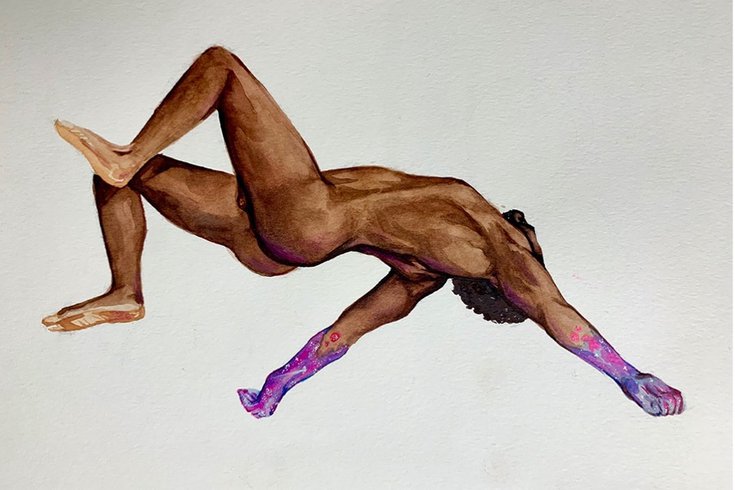
November 30, 2022
 Courtesy/The Black Paradise Project
Courtesy/The Black Paradise Project
"transition," De’von Downes
As Philadelphia works to address the mental health impacts of racism, Mural Arts Philadelphia and the City of Philadelphia’s Department of Behavioral Health and Intellectual disAbility Services have partnered on an initiative that aims to provide a pathway for community healing through public art projects.
The program, called Porch Light, put out a call for a psychologist and visual artist to develop a project to address mental health issues within the Black community. In response, counseling psychologist Kimberly Marie Ashby, PhD, and visual artist Yannick Lowery created the Black Paradise Project. The project aims to reduce the mental health burden of exposure to racism by providing opportunities for Black people to share their experiences and engage in joy.
“Anti-Blackness is a serious problem,” says Dr. Ashby, whose research focuses on racial trauma and its effects on mental health. “A lot of the literature demonstrates that engagement in joyful activities — specifically activities that allow you to feel connected to others and put you in a state of flow and mindfulness — allow people to create a life worth living, despite the fact that they are negatively impacted by racism.”
With input from Philadelphia’s Department of Behavioral Health and Intellectual Disabilities Services, the Black Paradise Project organizes a variety of events, from dance and yoga to nature hikes and reflective writing workshops. People of all ages and communities throughout Philadelphia attend these activities. “Our events have the goal to help people find peace and relief, especially during a time of racial turmoil,” artist Lowery says.
Lowery is incorporating images from the organization’s events during the past year into a mural that will be installed in West Philadelphia. The mural’s composition will demonstrate the methods that members of the Black community have used to “find paradise.”
The adult Black community is 20 percent more likely to experience serious mental health problems such as major depressive disorder or generalized anxiety disorder, according to Thomas A. Vance, PhD, of Columbia University’s Department of Psychiatry. The increased incidence of psychological difficulties, Vance says, is related to the lack of access to culturally responsive mental health care and prejudice inherent in the daily environment, as well as issues related to economic insecurity and the associated experiences, such as violence and criminal injustice.
Racial trauma is a form of post-traumatic stress disorder, but it’s never-ending,” Dr. Ashby notes. In a culture that often demands a show of strength and resilience, “There’s never any room for softness or vulnerability,” she says. “True freedom is being able to be fully human.”
To reduce the stigma of seeking care and to help people cope, the Black Paradise Project launched the Finding Paradise: A Black Mental Health Anthology project this spring. From 30 submissions of visual art, essays, and poetry, Lowery and Ashby chose 19 to appear in a digital and printed anthology.
The work is powerful. In “I’ll Show You the Way,” award-winning artist Afi Ese, of Houston, Texas, holder of a master of science degree in forensic psychology, depicts a dark bird covering a man’s head like a headdress. The image invites viewers to decide if the figure is wearing the animal or perhaps directing him.
In the 2018 poem, “You have that Depression thing, right?” Ailisha Sher of Philadelphia writes, “When sadness walks in/Grey is the only color I can wear without fear of a witch-hunt, and/Trees become helpless victims to intense bear hugs because at least trees can’t run away from me.”
“I was blown away” by the submissions, Lowery says. “I didn’t expect people to be so vulnerable. I think people can benefit from these and realize that they’re not alone.”
For more information about mental health self-care strategies and where to find help, visit ibx.com/knowyourmind or mindphltogether.com.
This content was originally published on IBX Insights.